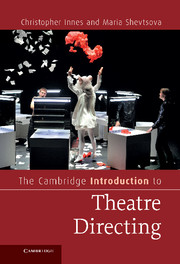Book contents
- Frontmatter
- Contents
- List of illustrations
- Acknowledgements
- Introduction
- Chapter 1 Traditional staging and the evolution of the director
- Chapter 2 The rise of the modern director
- Chapter 3 Directors of theatricality
- Chapter 4 Epic theatre directors
- Chapter 5 Total theatre: the director as auteur
- Chapter 6 Directors of ensemble theatre
- Chapter 7 Directors, collaboration and improvisation
- Notes
- Select bibliography
- Index
Introduction
Published online by Cambridge University Press: 05 April 2013
- Frontmatter
- Contents
- List of illustrations
- Acknowledgements
- Introduction
- Chapter 1 Traditional staging and the evolution of the director
- Chapter 2 The rise of the modern director
- Chapter 3 Directors of theatricality
- Chapter 4 Epic theatre directors
- Chapter 5 Total theatre: the director as auteur
- Chapter 6 Directors of ensemble theatre
- Chapter 7 Directors, collaboration and improvisation
- Notes
- Select bibliography
- Index
Summary
Over the twentieth and twenty-first centuries, the director has come to be identified as a significant creative figure in European and North American theatre. Indeed, in festival, experimental and off-Broadway theatres, as well as in countries such as Germany, it can be argued that audiences are drawn to productions more by the name of the director than by the name of the author or the title of the play itself, or even by star actors. And it is to directors that the development of modern theatre can be traced in its varying manifestations. This book is a response to the emergence of such a vital artistic force, which makes it important to understand how the interrelationships now work between the different creative elements of the theatrical art, and what the guiding principles are, or how the contemporary stylistic forms are produced.
The function and position of the contemporary, twenty-first-century theatre director emerged (as discussed in Chapter 2 of this book) from the actor-manager of the nineteenth century and the pioneering endeavours, primarily in Europe, of Ludwig Chronegk at the Meiningen and Konstantin Stanislavsky at the Moscow Art Theatre. Other major figures in the first half of the twentieth century, from Max Reinhardt and Edward Gordon Craig to Bertolt Brecht, contributed, equally, to the transformations that are integral to modern directing. From these rich beginnings, numerous variations on the role of the director and how this person directs have followed, giving rise to complex interconnections of practice and thought in the making of theatre. The director has become an artistic figure in his or her own right: a figure who is not necessarily a manager or administrator, or an actor, nor one beholden to playwrights.
- Type
- Chapter
- Information
- The Cambridge Introduction to Theatre Directing , pp. 1 - 5Publisher: Cambridge University PressPrint publication year: 2013



